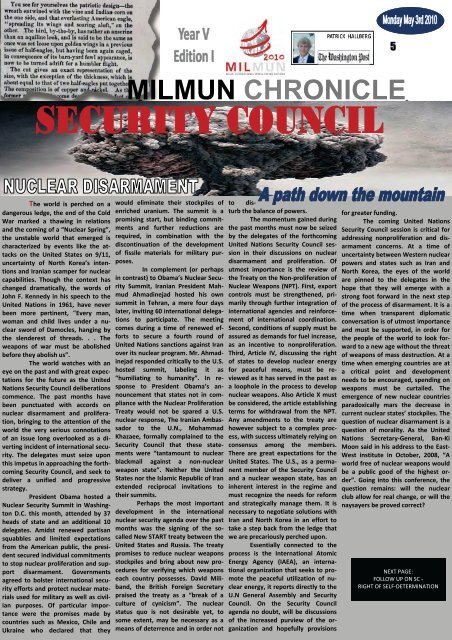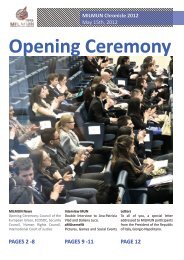Create successful ePaper yourself
Turn your PDF publications into a flip-book with our unique Google optimized e-Paper software.
5<br />
<strong>MILMUN</strong> CHRONICLE<br />
The world is perched on a<br />
dangerous ledge, the end of the Cold<br />
War marked a thawing in relations<br />
and the coming of a “Nuclear Spring”,<br />
the unstable world that emerged is<br />
characterized by events like the attacks<br />
on the United States on 9/11,<br />
uncertainty of North Korea’s intentions<br />
and Iranian scamper for nuclear<br />
capabilities. Though the context has<br />
changed dramatically, the words of<br />
John F. Kennedy in his speech to the<br />
United Nations in 1961, have never<br />
been more pertinent, "Every man,<br />
woman and child lives under a nuclear<br />
sword of Damocles, hanging by<br />
the slenderest of threads. . . The<br />
weapons of war must be abolished<br />
before they abolish us”.<br />
The world watches with an<br />
eye on the past and with great expectations<br />
for the future as the United<br />
Nations Security Council deliberations<br />
commence. The past months have<br />
been punctuated with accords on<br />
nuclear disarmament and proliferation,<br />
bringing to the attention of the<br />
world the very serious connotations<br />
of an issue long overlooked as a diverting<br />
incident of international security.<br />
The delegates must seize upon<br />
this impetus in approaching the forthcoming<br />
Security Council, and seek to<br />
deliver a unified and progressive<br />
strategy.<br />
President Obama hosted a<br />
Nuclear Security Summit in Washington<br />
D.C. this month, attended by 37<br />
heads of state and an additional 10<br />
delegates. Amidst renewed partisan<br />
squabbles and limited expectations<br />
from the American public, the president<br />
secured individual commitments<br />
to stop nuclear proliferation and support<br />
disarmament. Governments<br />
agreed to bolster international security<br />
efforts and protect nuclear materials<br />
used for military as well as civilian<br />
purposes. Of particular importance<br />
were the promises made by<br />
countries such as Mexico, Chile and<br />
Ukraine who declared that they<br />
would eliminate their stockpiles of<br />
enriched uranium. The summit is a<br />
promising start, but binding commitments<br />
and further reductions are<br />
required, in combination with the<br />
discontinuation of the development<br />
of fissile materials for military purposes.<br />
In complement (or perhaps<br />
in contrast) to Obama’s Nuclear Security<br />
Summit, Iranian President Mahmud<br />
Ahmadinejad hosted his own<br />
summit in Tehran, a mere four days<br />
later, inviting 60 international delegations<br />
to participate. The meeting<br />
comes during a time of renewed efforts<br />
to secure a fourth round of<br />
United Nations sanctions against Iran<br />
over its nuclear program. Mr. Ahmadinejad<br />
responded critically to the U.S.<br />
hosted summit, labeling it as<br />
“humiliating to humanity”. In response<br />
to President Obama’s announcement<br />
that states not in compliance<br />
with the Nuclear Proliferation<br />
Treaty would not be spared a U.S.<br />
nuclear response, The Iranian Ambassador<br />
to the U.N., Mohammad<br />
Khazaee, formally complained to the<br />
Security Council that these statements<br />
were “tantamount to nuclear<br />
blackmail against a non‐nuclear<br />
weapon state”. Neither the United<br />
States nor the Islamic Republic of Iran<br />
extended reciprocal invitations to<br />
their summits.<br />
Perhaps the most important<br />
development in the international<br />
nuclear security agenda over the past<br />
months was the signing of the socalled<br />
New START treaty between the<br />
United States and Russia. The treaty<br />
promises to reduce nuclear weapons<br />
stockpiles and bring about new procedures<br />
for verifying which weapons<br />
each country possesses. David Miliband,<br />
the British Foreign Secretary<br />
praised the treaty as a “break of a<br />
culture of cynicism”. The nuclear<br />
status quo is not desirable yet, to<br />
some extent, may be necessary as a<br />
means of deterrence and in order not<br />
to disturb<br />
the balance of powers.<br />
The momentum gained during<br />
the past months must now be seized<br />
by the delegates of the forthcoming<br />
United Nations Security Council session<br />
in their discussions on nuclear<br />
disarmament and proliferation. Of<br />
utmost importance is the review of<br />
the Treaty on the Non‐proliferation of<br />
Nuclear Weapons (NPT). First, export<br />
controls must be strengthened, primarily<br />
through further integration of<br />
international agencies and reinforcement<br />
of international coordination.<br />
Second, conditions of supply must be<br />
assured as demands for fuel increase,<br />
as an incentive to nonproliferation.<br />
Third, Article IV, discussing the right<br />
of states to develop nuclear energy<br />
for peaceful means, must be reviewed<br />
as it has served in the past as<br />
a loophole in the process to develop<br />
nuclear weapons. Also Article X must<br />
be considered, the article establishing<br />
terms for withdrawal from the NPT.<br />
Any amendments to the treaty are<br />
however subject to a complex process,<br />
with success ultimately relying on<br />
consensus among the members.<br />
There are great expectations for the<br />
United States. The U.S., as a permanent<br />
member of the Security Council<br />
and a nuclear weapon state, has an<br />
inherent interest in the regime and<br />
must recognize the needs for reform<br />
and strategically manage them. It is<br />
necessary to negotiate solutions with<br />
Iran and North Korea in an effort to<br />
take a step back from the ledge that<br />
we are precariously perched upon.<br />
Essentially connected to the<br />
process is the International Atomic<br />
Energy Agency (IAEA), an international<br />
organization that seeks to promote<br />
the peaceful utilization of nuclear<br />
energy, it reports directly to the<br />
U.N General Assembly and Security<br />
Council. On the Security Council<br />
agenda no doubt, will be discussions<br />
of the increased purview of the organization<br />
and hopefully provisions<br />
for greater funding.<br />
The coming United Nations<br />
Security Council session is critical for<br />
addressing nonproliferation and disarmament<br />
concerns. At a time of<br />
uncertainty between Western nuclear<br />
powers and states such as Iran and<br />
North Korea, the eyes of the world<br />
are pinned to the delegates in the<br />
hope that they will emerge with a<br />
strong foot forward in the next step<br />
of the process of disarmament. It is a<br />
time when transparent diplomatic<br />
conversation is of utmost importance<br />
and must be supported, in order for<br />
the people of the world to look forward<br />
to a new age without the threat<br />
of weapons of mass destruction. At a<br />
time when emerging countries are at<br />
a critical point and development<br />
needs to be encouraged, spending on<br />
weapons must be curtailed. The<br />
emergence of new nuclear countries<br />
paradoxically mars the decrease in<br />
current nuclear states’ stockpiles. The<br />
question of nuclear disarmament is a<br />
question of morality. As the United<br />
Nations Secretary‐General, Ban‐Ki<br />
Moon said in his address to the East‐<br />
West institute in October, 2008, “A<br />
world free of nuclear weapons would<br />
be a public good of the highest order”.<br />
Going into this conference, the<br />
question remains: will the nuclear<br />
club allow for real change, or will the<br />
naysayers be proved correct?<br />
NEXT PAGE:<br />
FOLLOW UP ON SC ‐<br />
RIGHT OF SELF‐DETERMINATION



